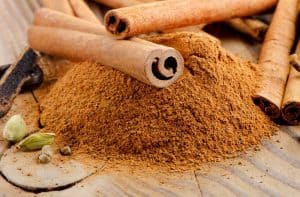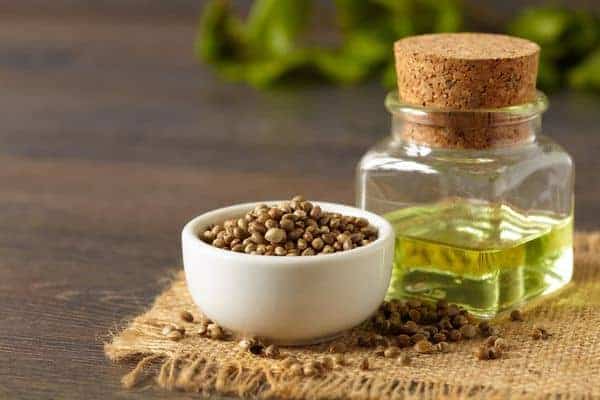
Cinnamon as a way to lose weight? Read the article and use it in your diet!
A slimming diet should not only be well balanced and full of essential nutrients, preferably of natural, plant origin. It is also worth taking care of its taste and lack of monotony, not limiting ourselves to just a few dishes. Healthy cuisine, even in the diet version, can really be tasty and varied if only we use diversified spices. Many of them will not only improve the taste of your morning oatmeal or regular vegetable soup, but they also have numerous health and weight loss promoting properties. In addition to pepper, full of piperine or paprika with capsaicin in its composition, substances that facilitate burning of fat tissue, cinnamon is also worth interest. Not only does it go well with both sweet and bitter dishes, its beneficial effects on health cannot be underestimated either. That’s why it is appreciated by specialists in various fields of medicine, including weight loss, and is included in the composition of many dietary supplements to facilitate this.
Contents
Where does cinnamon grow in nature and what are the four main varieties?

Cinnamon has been known in European cuisine since ancient times, when it became a popular spice on the tables of the rich in Greece and Rome. In this case, it came from Egypt, where cinnamon trees are still cultivated today. They belong to the laurel family (Lauraceae) and there are more than 250 species, even growing to more than 10 meters, although lower varieties, not exceeding 2 – 3 meters, are used to obtain cinnamon. Their place of origin is directly related to the four main varieties of this tasty spice and you will find:
- Ceylon cinnamon, originating from Sri Lanka, an island off the southern coast of India, light brown in colour, with a slightly sweet taste;
- Indonesian cinnamon, as its name suggests from Indonesia, darker in color with a sharp, not sweet taste;
- Vietnamese cinnamon, also dark, red-brown, with a mixed taste, spicy and sweet;
- cassia cinnamon, commonly called Chinese cinnamon, sharp and bitter, dark red and brown at the same time.
The two most popular and widely used varieties of cinnamon are Ceylon and Chinese, which are worth having in your kitchen to quickly feel the positive effects of their numerous health properties by adding them to dishes. We especially recommend Ceylon cinnamon, rolled into characteristic thin sticks in the shape of two adjacent tubes, whose aroma and taste can not be compared with anything else. In fact, it is the bark of the cinnamon tree, which after cutting is subjected to the process of initial fermentation and then cut according to the order of the recipient and dried naturally in the sun. We strongly recommend buying cinnamon sticks rather than in ground form, less flavorful and lacking some of its valuable properties.
The most important cinnamon nutrients you should be interested in
Most of us appreciate cinnamon just as another spice, deservedly so, without even thinking about its composition full of nutrients, many of which also allow rapid weight reduction . However, be careful with its amount, despite the fact that it has some slimming properties, it is quite high-calorie, 100 g is up to 247 kcal, fortunately not much of it is added to meals. The most valuable ingredients found in cinnamon are:
- dietary fiber, as much as 53 g in 100 g of the spice. It can be safely considered the basis for proper digestion and metabolism;
- carbohydrates, in the amount of 53 g per 100 g;
- Vitamin A, i.e. retinol or beta-carotene, with antibacterial and antioxidant properties, removing free radicals, taking care of strong immunity and fast regeneration of damaged cells;
- vitamin B1, or thiamine, responsible, among other things, for the proper functioning of the heart, circulatory system, nervous system, accelerating the healing of wounds. It is also an antioxidant and strengthens the weakened immune system;
- vitaminB2, riboflavin, participating in metabolic processes leading to burning of fat tissue, activating other nutrients in our body, conditioning the entire mucous membrane of the digestive system;
- vitaminB3, niacin, whose task is to supervise the work of the brain and other elements of the nervous system, regulation of hormonal economy of the body, secretion of many important hormones, including cortisol, which affects the appearance of stress symptoms, and insulin responsible for maintaining normal blood sugar levels
- vitamin B6, pyridoxine, which takes part in the production of red blood cells and metabolism of amino acids and protein synthesis. Takes care of the heart, preventing many of its diseases, including particularly dangerous anemia, regulates blood pressure;
- vitamin B9, better known as folic acid, responsible for normal growth and development of all cells in our body, and together with vitamin B12 prevents the development of anemia;
- Vitamin C, ascorbic acid, acting similarly to vitamin A, as an antioxidant that removes pathogenic free radicals from the body and strengthens immunity;
- minerals: calcium, magnesium, potassium, phosphorus, zinc, iron, manganese.
What health benefits do we gain by introducing cinnamon to our diet

Before we go on to describe all the healing and slimming properties of cinnamon, we must mention one more important ingredient, coumarin. Unfortunately, this is a substance that is not very beneficial to our health, especially when consumed in too large quantities. Its amount varies for different species of this spice, fortunately the Ceylon variety has the least amount of it. Undesirable effects of coumarin come down primarily to increased risk of liver and kidney damage, but provided in proper doses it also has some advantages, acting anti-inflammatory and anti-coagulant, helping to fight fungal and parasitic infections. So it is not quite as harmful as it is portrayed and should in no way impinge on the decision to introduce cinnamon in your diet, which, by the way, is recommended by doctors and nutritionists, highlighting such most relevant health benefits as:
Cinnamon in all its forms helps to deal with most infections, regardless of their background, bacterial or viral. After all, it is commonly used to treat the common cold, added to hot milk with honey, a drink given to us by our Mothers or Grandmothers. Research has shown that this spice does an excellent job of eliminating many bacteria that can cause dangerous diseases, most notably Escherichia coli (e. Coli bacteria), the Escherichia coli leading to infections within the digestive system. This is manifested by severe abdominal pain, diarrhea, vomiting, general weakness of the body and accompanied by a strong fever, difficult to beat. Cinnamon is also effective against salmonella bacteria, the cause of gastroenteritis, as well as certain species of fungi, yeasts, and molds belonging, for example, to the Candida species. The antibacterial properties will also come in handy when it comes to acne, dealing with virtually every type of acne-causing microorganism.
Anti-cancer properties
Research on the use of cinnamon in the treatment and prevention of cancer has been conducted for many years and the first results are really promising. Antioxidant properties have been confirmed, which, as we know, makes it possible to remove one of the causes of cancer development, i.e. free radicals which are destructive in action.
Effective protection of the heart, cardiovascular system, brain and nervous system
This is due primarily to the properties of cinnamon lowering and maintaining normal levels of cholesterol in the blood, allowing to avoid the formation of venous congestion, even life-threatening. Cinnamon regulates the flow of blood, thus facilitating the proper oxygenation of the whole body, including the brain, so we can count on better memory and concentration, which is particularly important for people studying or working mentally. Prevention of cardiovascular diseases is also supported by the properties of cinnamon that help maintain proper blood glucose levels and reduce insulin resistance.
This is why its use is recommended for the treatment of both type I and type II diabetes, and tests have shown that when consumed on an empty stomach, it reduces sugar levels by up to about 30 percent. Cinnamon’s effect on brain function also involves inhibiting the accumulation of the tau protein found in nerve cells and responsible for Alzheimera disease. Similar and increasing results are also obtained in alleviating the symptoms of Parkinson‘s disease.
Slimming and weight loss properties

For us, however, as the title of this article suggests, the most important are the slimming properties of cinnamon. However, it is impossible not to present earlier other ailments in the treatment of which it can be used, because they are directly related to the development of overweight and obesity. It can be said that the principle of communicating vessels applies here, many diseases are caused by the increase of our weight and vice versa, they can become the cause of the fact that we gain weight. Cinnamon promotes weight loss primarily because it is counted among the so-called thermogenic, that is substances which allow for more efficient burning of all the unnecessary fat. Similarly to capsaicin from pepper or piperine obtained from black peppercorns, it intensifies the processes of thermogenesis and lipolysis, thanks to which it is possible to raise the body temperature and thus reduce excess calories and fat cells.
This is done completely safely and there is no health risk here, as is often the case with artificial, synthetic “burners” bought from an unverified source, the use of which can end tragically. In the case of cinnamon there is no such problem, and another factor that affects the effectiveness of weight loss treatment is the aforementioned increase in insulin sensitivity of the body. Diabetes and obesity are diseases that almost always occur in tandem, and the first is usually caused by large amounts of body fat accumulated on the abdomen, which disturbs the entire hormonal balance of the body, especially the degree of insulin assimilation. Let’s also take into account the impact of cinnamon on digestive and metabolic processes leading to a faster breakdown of not only fats, but also carbohydrates. Of course, cinnamon, like many other spices similar to it, should be treated only as an addition to a healthy, well-balanced diet, devoid of anything fatty and fattening. It should also be combined with physical activity, recommended by doctors and nutritionists, walks with sticks, exercises with dumbbells, and after strengthening the condition also with running and long bike rides.
Read also: Ranking of fat burners
The most common contraindications that prevent the use of cinnamon
Despite its undoubted advantages and assistance in achieving the dream low weight and slim figure, not everyone can use cinnamon, because in some cases it causes quite troublesome side effects. These include:
- typical allergic reactions, mainly skin, redness, irritation, rashes and acne lesions;
- disorders of the digestive system, indigestion, diarrhea, and in extreme cases, vomiting and stomach pains;
- Possible side effects in pregnant women who should definitely not use this spice, because it can cause miscarriage, for them ginger is better, not posing such a risk;
- the mentioned risk of liver and kidney damage due to the consumption of too much harmful coumarin, which can have toxic effects.
Sources:
- https://www.healthline.com/nutrition/10-proven-benefits-of-cinnamon
- https://www.healthline.com/nutrition/side-effects-of-cinnamon#1



